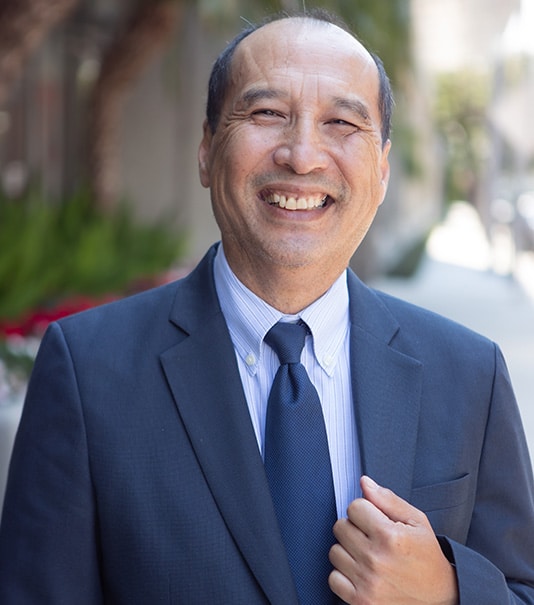How to Win a Criminal Trial

One of California’s top criminal trial lawyers, Aaron Spolin, puts it pretty simply when he explains how to win a criminal case: “You need a three-part approach: (1) file legal ‘motions’ to dismiss the case, (2) argue for the exclusion of evidence, and (3) explain clearly to the jury why the client is innocent.” This strategy has been successful for many of his former clients. (Of course, prior success is not a “guarantee” of the same outcome in a future case.)
Mr. Spolin explains how these strategies work:
- Filing Legal “Motions” to Dismiss the Case
A legal “motion” is a request. It is usually given to the judge on a criminal case. One of the most powerful legal motions is the Motion to Dismiss. If this motion is granted, then the case is over and the client should be immediately released. A motion to dismiss can be based on many things, including insufficient evidence at a preliminary hearing, misconduct on the part of the prosecutor (like destroying evidence), insufficient evidence at trial, and a number of other reasons. Trial attorney Aaron Spolin explains these reasons in more detail in the section below, Legal Motions to Dismiss. - Arguing for the Exclusion of Evidence
Excluding evidence from a case means preventing a jury from hearing about certain information. This is usually used when the evidence is unreliable (like “hearsay”) or was discovered after the police violated a person’s rights. Excluding evidence from a trial can harm the prosecution’s case and make it much harder to get a conviction. In many cases, if crucial evidence is excluded then the prosecution is forced to dismiss the case. Veteran criminal trial lawyer Don Nguyen explains how to win these arguments in the section below, Exclusion of Evidence in Criminal Trials. - Explaining Client’s Innocence to the Jury
In most trials, a jury decides whether a person is guilty or not. Therefore, one of the most important tasks of a trial lawyer is to demonstrate why the jury should vote for “not guilty.” As successful trial lawyer Jeremy Cutcher describes it: “showing a client’s innocence is only one part of the strategy. You also have to explain the very high burden of proof that the prosecution must meet.” In criminal trials, this burden is called proof beyond a reasonable doubt. Prosecutors often ask juries to simply use “common sense” to decide what happened. But if a jury is going to take a person’s freedom, they cannot simply go with their gut instinct. They must have no reasonable doubts in their mind, which is often very hard to achieve. Jeremy Cutcher describes this (and other jury trial arguments) in the section below, Arguments That Win Trials.
To learn more about how these strategies might apply to your case, call Mr. Spolin, Mr. Nguyen, or Mr. Cutcher at their law firm, Spolin Law P.C., (310) 424-5816.
- How to Win a Criminal Trial
- How a “Trial Lawyer” is Different from a “Defense Lawyer”
- Legal Motions to Dismiss a Case
- Exclusion of Evidence
- Arguments that Win Trials
- Meet CA’s Top 3 Trial Lawyers
- The Importance of an Experienced Trial Lawyer
How a “Trial Lawyer” is Different From a “Defense Lawyer”
You may be surprised to know that the vast majority of criminal defense lawyers have never won a not-guilty verdict at trial. This means two things:
- It is unrealistic to expect a lawyer to get a not-guilty verdict on your trial if they have never gotten a not-guilty verdict before.
- Prosecutors often know which lawyers never win at trial — and if a prosecutor knows that a lawyer never wins at trial, they are much less likely to try to negotiate a good plea deal.
This means that finding for yourself a successful trial lawyer is probably the most important step you can take to fight a criminal case. A trial lawyer with a record of success is more likely to win your trial (obviously) and also more likely to negotiate a better plea deal if you are interested in taking a plea deal.
But how can you tell the difference between a successful trial lawyer and a generic criminal defense lawyer? Here is how: Ask them these two questions:
|
Question 1: |
“How many not-guilty jury verdicts have you gotten?” |
|
Question 2: |
“Can you please give me the case numbers and courthouses of these not-guilty verdicts, so I can verify them?” |
If the lawyer will not answer the 2nd question, it’s a red flag that the person does not in fact have experience getting not-guilty verdicts at trial. Case numbers are public records (and not confidential); therefore, if a lawyer gives excuses for not sharing the case numbers, it is reasonable to think that perhaps they were exaggerating their success rate.
Hiring a trial lawyer with experience winning is crucial in fighting your case. That is because a lawyer who knows how to win will have a better chance of convincing the prosecutor to offer an acceptable deal and, of course, is more likely to simply win a not-guilty verdict on your case if a trial becomes necessary.
- How to Win a Criminal Trial
- How a “Trial Lawyer” is Different from a “Defense Lawyer”
- Legal Motions to Dismiss a Case
- Exclusion of Evidence
- Arguments that Win Trials
- Meet CA’s Top 3 Trial Lawyers
- The Importance of an Experienced Trial Lawyer
Legal Motions to Dismiss a Case

One effective way to win a case is to file a Motion to Dismiss and convince the judge that the government has failed to prove its case. Effectively, this is asking the judge to find in favor of the defendant based on the information presented so far. A judge will either grant or deny the motion.
Motions to dismiss may be submitted either before the trial (as a pre-trial motion) or after arguments have been made at trial, but before the jury makes a determination.
A motion to dismiss argues that the government:
- Failed to follow required legal procedures;
- Made a mistake with the charging documents;
- Violated the defendant’s rights; or
- Violated the statute of limitations (did not meet legal deadlines).
When your trial attorney files a motion to dismiss, they must state the specific legal reason that dismissal of the case is warranted. Some examples of grounds for dismissal of criminal charges include:
- Lack of Jurisdiction — The state in which a crime occurred is the only state that can bring charges and hear a case against a defendant. If you are accused of a crime that happened in Florida, but California has filed the charges, your attorney should be able to get the case dismissed.
- Lack of Evidence — When the government files a criminal case against you, they must have sufficient facts to show that all of the elements of a particular crime have been met. If they do not have enough evidence to show that the specific crime they are alleging occurred or you did not commit the crime, then the judge may grant a dismissal.
- Statute of Limitations — Some criminal charges must be filed within a certain amount of time; otherwise, the government cannot file them against you at all, no matter how much evidence they have. If that expiration date has lapsed, then you may get a dismissal.
- Lack of Due Process — If your right to due process is violated by the government or its agents (often police officers), then your charges may be dismissed. Due process is often violated when you are forced to testify against yourself. It also prohibits you from being tried twice for the same crime.
- Failure to Provide a Speedy Trial — You have a Constitutional right to a speedy trial. If the government unnecessarily delays proceedings, then the charges may be dismissed.
- Charging Document was Defective — When the government files charges against you, they must include certain information in those documents, including specific dates, locations, and facts surrounding the alleged crimes. Failure to include those details may result in dismissal of the case.
After your lawyer files a motion to dismiss, the prosecutor will be given an opportunity to respond. The court may also set a hearing date to allow both sides to present arguments.
If your motion is granted, all of the charges will be thrown out. However, that’s not always the end. Sometimes the government is given the opportunity to refile charges and correct the mistakes they originally made. That’s why it’s essential that you continue working with your criminal defense lawyer to keep fighting for your rights.
- How to Win a Criminal Trial
- How a “Trial Lawyer” is Different from a “Defense Lawyer”
- Legal Motions to Dismiss a Case
- Exclusion of Evidence
- Arguments that Win Trials
- Meet CA’s Top 3 Trial Lawyers
- The Importance of an Experienced Trial Lawyer
Exclusion of Evidence

Another motion that your attorney may submit to the court is a Motion to Exclude or Suppress Evidence. This is typically done during the pre-trial phase of the case. It asks the court to ignore or throw out one or more pieces of evidence based on specific legal reasons.
If evidence is successfully excluded, it may be impossible for the government to prove all of the elements of the alleged crime. Then, your attorney may follow up with a motion to dismiss and get your case thrown out entirely.
There are many reasons that evidence may be excluded (or suppressed) by the court. Some common reasons include:
- Evidence was Illegally Obtained — This is often the case with evidence obtained through an illegal search and seizure, which is prohibited by the Fourth Amendment to the Constitution. If the police or investigators did not have a warrant based on probable cause before searching you, your car, your home, or your other property and belongings, then you may be able to get any evidence they found suppressed. Evidence seized during an illegal search is inadmissible pursuant to the “Exclusionary Rule.”
- Violation of the Chain of Custody — Evidence must be handled properly according to strict procedures. For example, if DNA evidence is not preserved properly or signed for by each person handling it, it may be excluded from the case. Any piece of evidence that is not accounted for every step of the process may be tainted or tampered with, and should not be allowed at trial.
- Statements that are Illegally Obtained — You have probably heard of “Miranda Rights,” which begin, “Anything you say can and will be held against you in a court of law…” If the police failed to read you your rights and asked you questions, then your responses may be inadmissible at trial.
When your attorney files a motion to suppress evidence, the court will likely set a hearing so that both sides can explain their arguments. Then, the judge will either grant or deny the motion. If the motion is granted, the evidence will not be allowed to be used in court against you.
- How to Win a Criminal Trial
- How a “Trial Lawyer” is Different from a “Defense Lawyer”
- Legal Motions to Dismiss a Case
- Exclusion of Evidence
- Arguments that Win Trials
- Meet CA’s Top 3 Trial Lawyers
- The Importance of an Experienced Trial Lawyer
Arguments that Win Trials
If your case does go to trial, you will want a trial attorney with a history of successfully persuading the jury to find their clients not guilty. Your trial attorney needs to both know the law and act as a psychologist — knowing how to convince the jury that the defendant is not guilty.
In a criminal trial, you don’t have to prove your innocence. You have to show that the prosecutor can’t prove beyond a reasonable doubt that you’re guilty. This burden is very heavy because the defendant’s freedom is in jeopardy. The prosecutor may try to simplify the decision for the jury by telling them to use their “gut instinct.” However, more is needed in order to find someone guilty of a crime. There must be absolutely no reasonable doubt in the minds of the jury members to determine whether someone committed a crime.
Your trial attorney might make several arguments to try to convince the jury that there is reasonable doubt that you committed a crime. Some common arguments that win trials include:
- The defendant did not understand the significance of the criminal actions. This might include arguments involving insanity, intoxication, or a mistake of law or fact. If you did not know what you were doing, your actions might not meet all of the elements of the crime.
- The defendant was justified in their actions. This includes arguments like self-defense (or defense of another person) and actions taken under duress or necessity. If someone was attacking you and you hit them back, your actions may have been justified.
- No crime actually occurred. This includes arguments that involve consent by the alleged victim, abandonment or withdrawal from criminal activities, and entrapment. For example, if the government induced you to commit a crime, then cannot attempt to punish you for it.
While making these arguments, your attorney will utilize evidence collected from witnesses, experts, and even information presented by the prosecutor. The best attorneys can use the evidence collected by the police against them. By explaining exactly how the prosecutor’s evidence does not meet their claims, your attorney can win your case and the jury will find you not guilty.
- How to Win a Criminal Trial
- How a “Trial Lawyer” is Different from a “Defense Lawyer”
- Legal Motions to Dismiss a Case
- Exclusion of Evidence
- Arguments that Win Trials
- Meet CA’s Top 3 Trial Lawyers
- The Importance of an Experienced Trial Lawyer
Meet CA’s Top 3 Trial Lawyers

The award-winning lawyers at Spolin Law, P.C. are more than criminal defense attorneys. They are trial lawyers. They know how to utilize the information available to dismiss cases, exclude improper evidence, and win trials. You can read more about their successes on the Awards, Media, and Publications page.
Mr. Spolin, Mr. Nguyen, and Mr. Cutcher are skilled in presenting motions to the judge. They have achieved many case dismissals based on their motions to dismiss. They also know how to utilize motions to exclude evidence to suppress the most damning information being used against you by the prosecution. In the end, even if your case does go to trial, they will make every argument possible to win your case.
Attorney Aaron Spolin
Mr. Spolin is a former prosecutor and award-winning criminal lawyer. He has been on both sides of a criminal case, so he knows how the prosecutor will form a case against you. He will use that knowledge to develop strong motions and arguments in court to ultimately get your case dismissed or convince the jury to find you not guilty.
Attorney Don Nguyen
With more than two decades of criminal defense experience, Mr. Nguyen is one of the best trial attorneys in California. He routinely uses his knowledge of the law to aggressively argue cases for his clients. He has successfully had many cases dismissed by the court, and he has also achieved not guilty verdicts for clients who were facing serious criminal penalties.
Attorney Jeremy Cutcher
Mr. Cutcher has experience working in the public defender’s office as well as directly for the California Supreme Court. He has experience with all types of criminal cases, and he knows how judges and juries think. He utilizes this information to successfully argue for his clients in court.
Top Trial Attorneys Fighting For You
To learn more about how these strategies might apply to your case, call Mr. Spolin, Mr. Nguyen, or Mr. Cutcher at their law firm, Spolin Law P.C., (310) 424-5816.
- How to Win a Criminal Trial
- How a “Trial Lawyer” is Different from a “Defense Lawyer”
- Legal Motions to Dismiss a Case
- Exclusion of Evidence
- Arguments that Win Trials
- Meet CA’s Top 3 Trial Lawyers
- The Importance of an Experienced Trial Lawyer
The Importance of an Experienced Trial Lawyer
It’s not only important to find a lawyer who understands the law, but also to hire one who has experience taking cases all the way to trial. Your attorney’s comfort in a courtroom can have a direct impact on how your case turns out. Spolin Law P.C. is led by attorney Aaron Spolin, a former prosecutor and award-winning criminal trial lawyer. He is ranked in the top 1% of criminal law attorneys in California and is recognized as one of the “10 Best Criminal Law Attorneys” in California by the American Institute of Criminal Law Attorneys. His awards directly reflect the acknowledgment of his peers and the legal industry that he is a top-performing criminal trial attorney.
An exceptional trial attorney can make a difference in several ways.
- Presenting the Best Defenses. You are not limited on how many defenses you can make on your behalf. In fact, you can present as many defenses as fit your specific situation, and there are almost always multiple that apply. The best trial attorney will review the record and use as many defenses as possible.
- Finding Faults in the Prosecutor’s Claims. No matter how much evidence they have against you, the Prosecutor, police, investigators, and others make mistakes. It’s important to have an attorney who knows common pitfalls that the Government makes and points them out in pre-trial motions and in front of the judge and jury.
- Fighting to Win. Spolin Law P.C. has a forceful desire to achieve success in every case we handle. The firm is led by former prosecutor Aaron Spolin (Princeton, BA; UC Berkeley, JD), an award-winning trial attorney. He has achieved successful outcomes in a wide variety of criminal cases, including a recent murder case sent to the California Supreme Court. His trial experience at all levels of court gives him the knowledge to win cases.
To learn what options may be available in your case, contact the trial lawyers at Spolin Law P.C. for a free consultation. We are available at (310) 424-5816.
